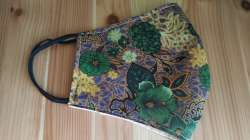New cloth mask kills 99.9 per cent bacteria, viruses in one hour of sunlight, says study
Researchers have developed a reusable cotton face mask that they say can kill up to 99.99 per cent of bacteria and viruses within 60 minutes of daylight exposure.

Researchers have developed a reusable cotton face mask that they say can kill up to 99.99 per cent of bacteria and viruses within 60 minutes of daylight exposure.
Face masks made of various cloth materials can filter nanoscale aerosol particles -- such as those released by a cough or sneeze -- potentially helping to reduce the spread of diseases, including COVID-19.
However, live bacteria and viruses on the surface of the mask could still be contagious, according to the study published in the journal ACS Applied Materials & Interfaces.
The researchers from the University of California, Davis in the US developed a new cotton fabric that would release reactive oxygen species (ROS) when exposed to daylight, killing microbes attached to the fabric''s surfaces while being washable, reusable and safe for the wearer.
A person could disinfect their cloth mask during their lunch hour outside in the sun, or by spending a longer period of time under office or building lights, which are much less intense than sunlight, they said.
The researchers made their antimicrobial fabrics by attaching positively charged chains of 2-diethylaminoethyl chloride (DEAE-Cl) to ordinary cotton.
They then dyed the modified cotton in a solution of a negatively charged photosensitizer -- a compound that releases ROS upon exposure to light -- which attached to the DEAE chains by strong electrostatic interactions.
The team found that a fabric made with a dye called rose Bengal as the photosensitiser killed 99.9999 per cent of bacteria added to the fabric within 60 minutes of daylight exposure and inactivated 99.9999 per cent of T7 bacteriophage -- a virus thought to be more resistant to ROS than some coronaviruses -- within 30 minutes.
Further testing showed that the material could be handwashed at least 10 times and constantly exposed to daylight for at least 7 days without losing its antimicrobial activity, the researchers said.
The fabric shows promise for making reusable, antibacterial/antiviral cloth face masks and protective suits, they said.